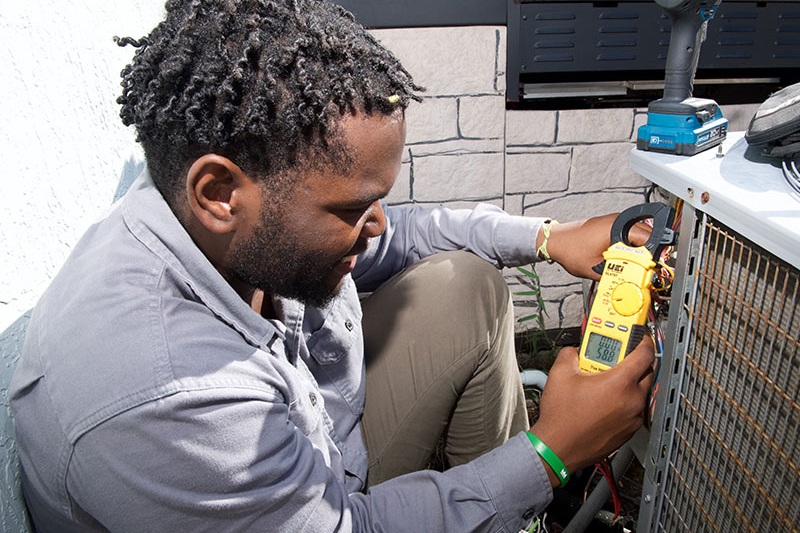TWS is a Great Training Option for Everyone
Learn more about how we can prepare you to advance your career.
Ready to become an HVAC or refrigeration tech? If you have your heart set on these roles, then Tulsa Welding School can help. We offer two different programs in HVAC and Electro-Mechanical Technologies. Depending on your path, you have multiple careers to choose from.
What Does an HVAC Tech Do?
An HVAC technician is responsible for installing, repairing, and maintaining heating, air conditioning, and ventilation systems. Part of the installation process may include installing electrical components and wiring. While repairing and maintaining the HVAC system, the HVAC tech may inspect and test the HVAC system and components. Plus, some parts and components may need to be replaced. HVAC techs will also educate customers on the proper use of HVAC systems. This includes using smart thermostats and taking advantage of energy-efficiency components.
What Does a Refrigeration Tech Do?
A refrigeration tech will learn about HVAC/R technologies but may focus on installing, maintaining, and repairing commercial refrigeration systems. They may complete preventative maintenance and perform calibration to ensure the refrigeration system is running efficiently. Part of the job of a refrigeration tech involves removing and disposing of refrigerant. Refrigeration techs that manage refrigerant must be 608 EPA certified to handle this hazardous material safely. Some of the refrigeration equipment these technicians will maintain includes refrigerated storage units, ice machines, cold storage warehouses, and grocery refrigeration.
Have You Considered a Career in the Skilled Trades?
Fill out the form to recieve a no obligation info packet.
How Do You Become an HVAC Tech or Refrigeration Tech?
A great way to become an HVAC or refrigeration tech is to complete the Electro-Mechanical Technologies or Refrigeration Technologies program at Tulsa Welding School. During this program, you will learn about HVAC and refrigeration systems. This gives you options to choose your career path within HVAC/R.
The Electro-Mechanical Technologies program focuses on electricity, solar, and refrigeration fundamentals. Additional courses review electrical wiring, comfort systems, and advanced troubleshooting techniques. The curriculum includes classroom lectures and hands-on training to prepare you for an apprenticeship after graduation.
What is the Difference Between HVAC Tech and Refrigeration Tech?
There are a few differences between HVAC techs and refrigeration techs. They include:

New: Industrial Maintenance
Learn About Our New Advanced Industrial Maintenance Program
Tulsa Welding School is proud to announce our newest program offering available at our Houston & Dallas Metro Campuses – Advanced Industrial Maintenance Technology! Learn the skills you need to take on the industries of manufacturing, distribution, energy production and facility maintenance in as few as 7 months.
Industry Specialization
Most HVAC technicians focus on heating, ventilation, and air conditioning, whereas refrigeration technicians focus mainly on refrigeration systems. Many HVAC/R programs teach both disciplines, but graduates can choose between the two fields.
Low vs. High-Temperature Refrigeration
Refrigeration techs typically work with low-temperature refrigeration, keeping perishable food and medicine from spoiling. At the same time, HVAC technicians focus on high-temperature refrigeration like that found in air conditioning units. Both require the handling of refrigerants and need a 608 EPA certification.
Tools and Equipment
The different tools and equipment an HVAC tech uses will be unique to that role, and the same is true for refrigeration technicians. HVAC techs use gauge manifolds, air velocity instrumentation, carbon monoxide, oxygen indicators, and temperature gauges. Refrigeration techs will use thermometers, multimeters, refrigerant leak detectors, welding torches, valve core removers, and service valve wrenches. There are different tools and equipment for each role.
Want to Learn More?
Electro-Mechanical Technologies
The Electro-Mechanical Technologies program focuses on today’s and future technologies. Along with HVAC/R, this program teaches the fundamentals of electricity, residential and commercial wiring, and comfort systems. This program also introduces students to solar energy technology and provides an overview of photovoltaic (PV) science.
Refrigeration Technologies
Because HVAC/R is a hands-on job, technical training is typically required for anyone to enter this field. Many people invest in a trade program to learn the trade skills they need to be safe and effective as a professional. To learn more about our Refrigeration Training program, contact us at Tulsa Welding School or call 1-855-981-7313.
This blog has been labeled as archived as it may no longer contain the most up-to-date data. For a list of all current blog posts, please visit our blog homepage at https://www.tws.edu/blog/







